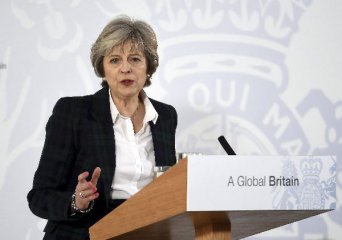Europe's response to British Prime Minister Theresa May's "hard Brexit" speech should not be apologetic or shrinking, a leading academic in European affairs said Tuesday. Prof.
Erika Harris, Director of Postgraduate studies in Politics and Co-Director of the Europe and the World Center at the University of Liverpool, gave her response to Xinhua following May's speech.
In the decisive speech that sets a course for a clean break with the European Union, May promised to quit the EU single market and seek a free trade agreement with the EU. The 12-point blueprint has been dubbed a "hard Brexit".
"The speech by Theresa May did not reveal that much new. ... She merely confirmed that Britain is leaving every institution of the EU and seeking the best possible deal for Britain," Harris said.
"In fact, the whole speech can be summed up by one value only -- a good deal," she said.
The prime minister also confirmed that Britain was never comfortable within the European Union.
May also revealed a number of threats should the EU adopt a punitive approach to British negotiations, such as loss of access to the British business and no sharing of intelligence information, Harris said.
The UE should seek its own best deal and prevent further disintegration of the EU.
Forthcoming French and German elections will be extremely important because the right wing parties there are anti-EU, and Brexit and the U.S. presidential election are undermining the EU.
"Hence, the EU's response should not be apologetic and shrinking, but confident in its future and principles that underpin it.
"After all, at the beginning of negotiations, both parties should start from a position of strength and with a degree of bluff, which is exactly what Theresa May did in her speech," Harris added.




















Latest comments